International HRM Challenges: Australia-France Manager Transfer, 2019
VerifiedAdded on 2023/01/11
|7
|1810
|62
Essay
AI Summary
This essay delves into the multifaceted challenges faced by an HR manager in relocating a managerial employee from Australia to France in 2019. It begins by examining the cultural differences between the two countries, highlighting issues such as power distance, individualism, and indulgence, and how these factors can impact the success of the relocation. The essay then moves on to analyze the political landscape in France, focusing on the impact of the Yellow Vest protests on employment, the economy, and employee security. The discussion also considers broader global political factors that affect international trade and business. The essay concludes by emphasizing the importance of IHRM in fostering a human-friendly environment, including motivational factors like safety, job security, training, and fair compensation, to ensure both employee well-being and organizational success. The study emphasizes the interconnectedness of employment and industrial relations, underscoring the IHRM's role in maintaining strong employee-industry relationships.
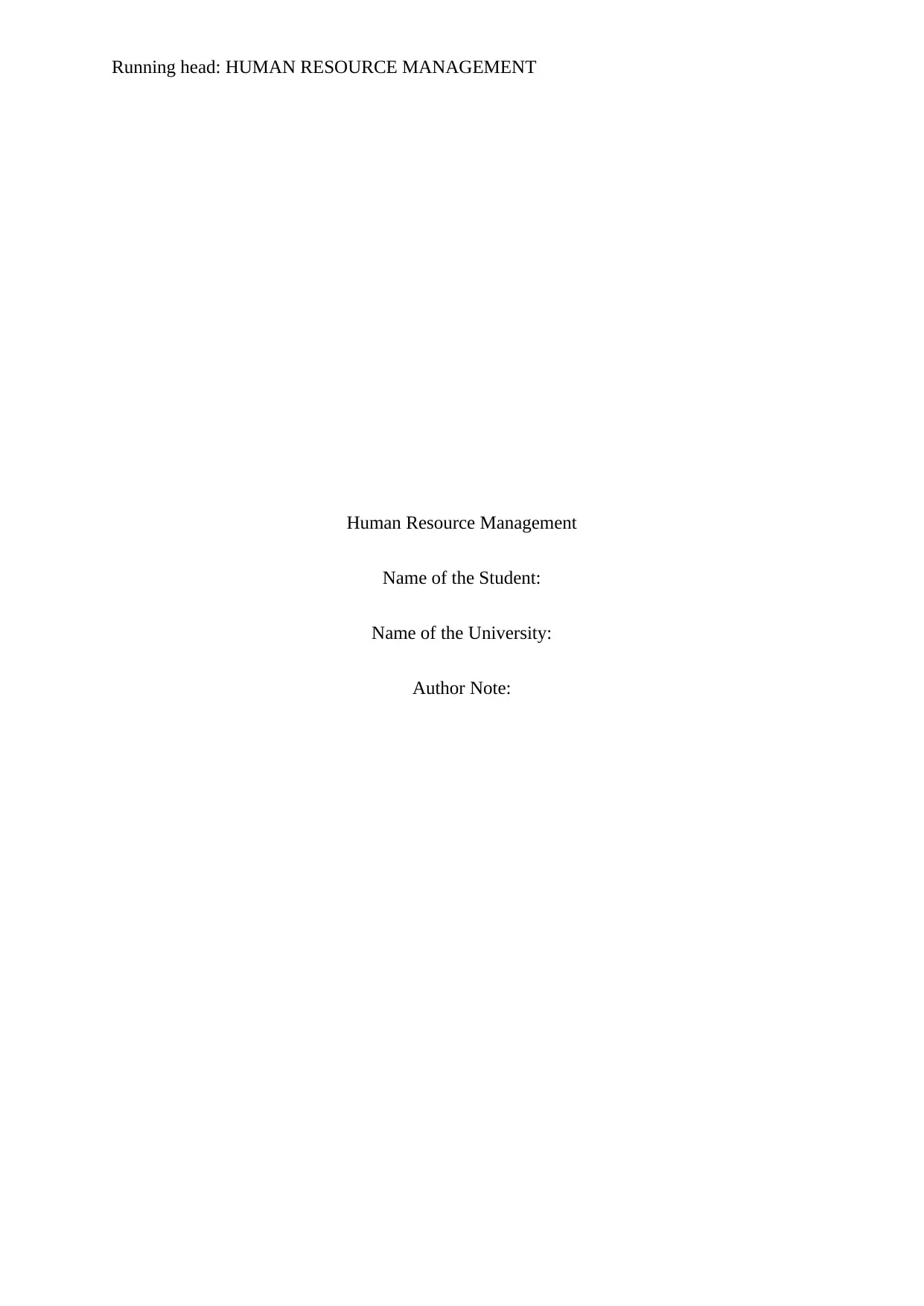
Running head: HUMAN RESOURCE MANAGEMENT
Human Resource Management
Name of the Student:
Name of the University:
Author Note:
Human Resource Management
Name of the Student:
Name of the University:
Author Note:
Paraphrase This Document
Need a fresh take? Get an instant paraphrase of this document with our AI Paraphraser
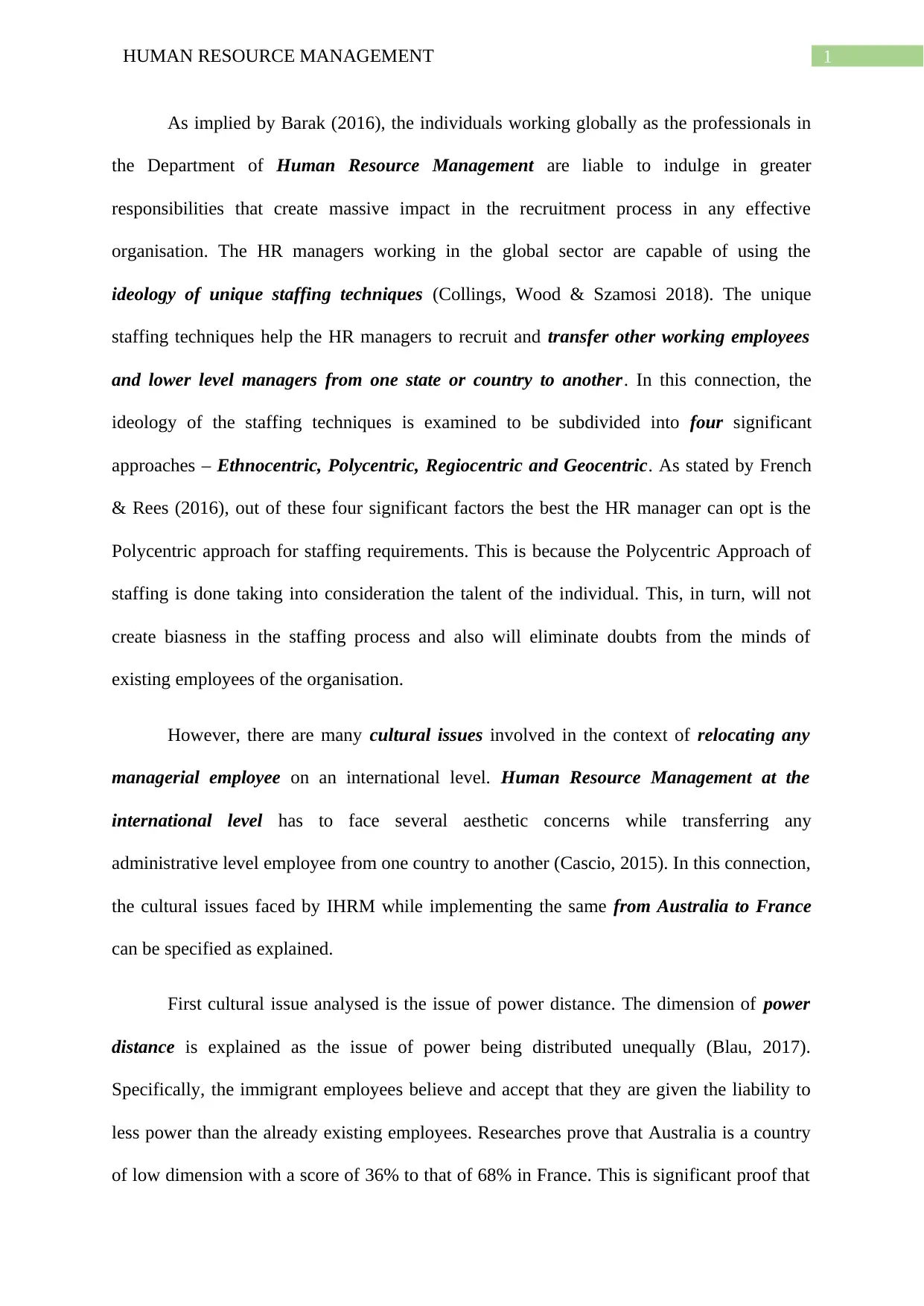
1HUMAN RESOURCE MANAGEMENT
As implied by Barak (2016), the individuals working globally as the professionals in
the Department of Human Resource Management are liable to indulge in greater
responsibilities that create massive impact in the recruitment process in any effective
organisation. The HR managers working in the global sector are capable of using the
ideology of unique staffing techniques (Collings, Wood & Szamosi 2018). The unique
staffing techniques help the HR managers to recruit and transfer other working employees
and lower level managers from one state or country to another. In this connection, the
ideology of the staffing techniques is examined to be subdivided into four significant
approaches – Ethnocentric, Polycentric, Regiocentric and Geocentric. As stated by French
& Rees (2016), out of these four significant factors the best the HR manager can opt is the
Polycentric approach for staffing requirements. This is because the Polycentric Approach of
staffing is done taking into consideration the talent of the individual. This, in turn, will not
create biasness in the staffing process and also will eliminate doubts from the minds of
existing employees of the organisation.
However, there are many cultural issues involved in the context of relocating any
managerial employee on an international level. Human Resource Management at the
international level has to face several aesthetic concerns while transferring any
administrative level employee from one country to another (Cascio, 2015). In this connection,
the cultural issues faced by IHRM while implementing the same from Australia to France
can be specified as explained.
First cultural issue analysed is the issue of power distance. The dimension of power
distance is explained as the issue of power being distributed unequally (Blau, 2017).
Specifically, the immigrant employees believe and accept that they are given the liability to
less power than the already existing employees. Researches prove that Australia is a country
of low dimension with a score of 36% to that of 68% in France. This is significant proof that
As implied by Barak (2016), the individuals working globally as the professionals in
the Department of Human Resource Management are liable to indulge in greater
responsibilities that create massive impact in the recruitment process in any effective
organisation. The HR managers working in the global sector are capable of using the
ideology of unique staffing techniques (Collings, Wood & Szamosi 2018). The unique
staffing techniques help the HR managers to recruit and transfer other working employees
and lower level managers from one state or country to another. In this connection, the
ideology of the staffing techniques is examined to be subdivided into four significant
approaches – Ethnocentric, Polycentric, Regiocentric and Geocentric. As stated by French
& Rees (2016), out of these four significant factors the best the HR manager can opt is the
Polycentric approach for staffing requirements. This is because the Polycentric Approach of
staffing is done taking into consideration the talent of the individual. This, in turn, will not
create biasness in the staffing process and also will eliminate doubts from the minds of
existing employees of the organisation.
However, there are many cultural issues involved in the context of relocating any
managerial employee on an international level. Human Resource Management at the
international level has to face several aesthetic concerns while transferring any
administrative level employee from one country to another (Cascio, 2015). In this connection,
the cultural issues faced by IHRM while implementing the same from Australia to France
can be specified as explained.
First cultural issue analysed is the issue of power distance. The dimension of power
distance is explained as the issue of power being distributed unequally (Blau, 2017).
Specifically, the immigrant employees believe and accept that they are given the liability to
less power than the already existing employees. Researches prove that Australia is a country
of low dimension with a score of 36% to that of 68% in France. This is significant proof that
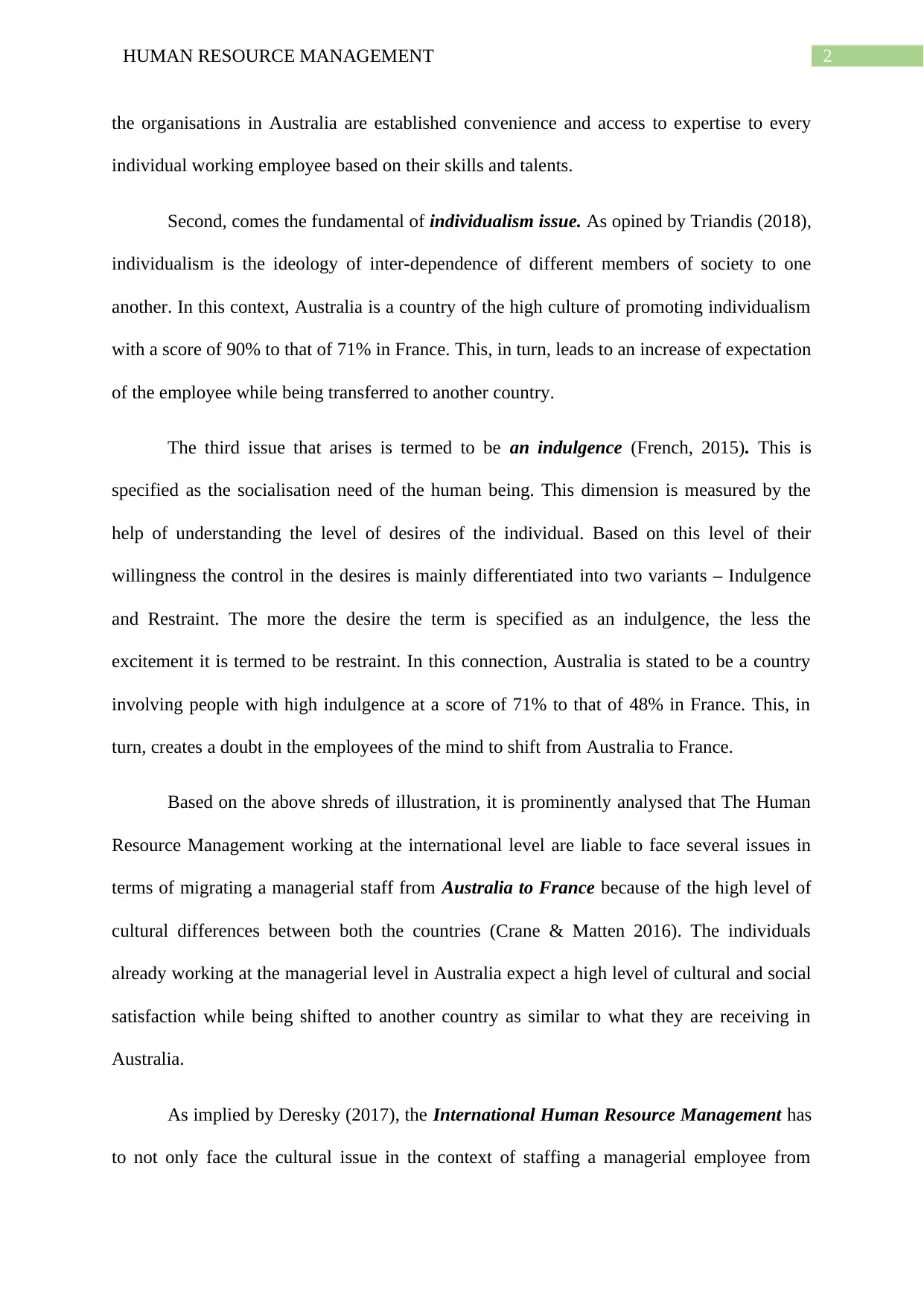
2HUMAN RESOURCE MANAGEMENT
the organisations in Australia are established convenience and access to expertise to every
individual working employee based on their skills and talents.
Second, comes the fundamental of individualism issue. As opined by Triandis (2018),
individualism is the ideology of inter-dependence of different members of society to one
another. In this context, Australia is a country of the high culture of promoting individualism
with a score of 90% to that of 71% in France. This, in turn, leads to an increase of expectation
of the employee while being transferred to another country.
The third issue that arises is termed to be an indulgence (French, 2015). This is
specified as the socialisation need of the human being. This dimension is measured by the
help of understanding the level of desires of the individual. Based on this level of their
willingness the control in the desires is mainly differentiated into two variants – Indulgence
and Restraint. The more the desire the term is specified as an indulgence, the less the
excitement it is termed to be restraint. In this connection, Australia is stated to be a country
involving people with high indulgence at a score of 71% to that of 48% in France. This, in
turn, creates a doubt in the employees of the mind to shift from Australia to France.
Based on the above shreds of illustration, it is prominently analysed that The Human
Resource Management working at the international level are liable to face several issues in
terms of migrating a managerial staff from Australia to France because of the high level of
cultural differences between both the countries (Crane & Matten 2016). The individuals
already working at the managerial level in Australia expect a high level of cultural and social
satisfaction while being shifted to another country as similar to what they are receiving in
Australia.
As implied by Deresky (2017), the International Human Resource Management has
to not only face the cultural issue in the context of staffing a managerial employee from
the organisations in Australia are established convenience and access to expertise to every
individual working employee based on their skills and talents.
Second, comes the fundamental of individualism issue. As opined by Triandis (2018),
individualism is the ideology of inter-dependence of different members of society to one
another. In this context, Australia is a country of the high culture of promoting individualism
with a score of 90% to that of 71% in France. This, in turn, leads to an increase of expectation
of the employee while being transferred to another country.
The third issue that arises is termed to be an indulgence (French, 2015). This is
specified as the socialisation need of the human being. This dimension is measured by the
help of understanding the level of desires of the individual. Based on this level of their
willingness the control in the desires is mainly differentiated into two variants – Indulgence
and Restraint. The more the desire the term is specified as an indulgence, the less the
excitement it is termed to be restraint. In this connection, Australia is stated to be a country
involving people with high indulgence at a score of 71% to that of 48% in France. This, in
turn, creates a doubt in the employees of the mind to shift from Australia to France.
Based on the above shreds of illustration, it is prominently analysed that The Human
Resource Management working at the international level are liable to face several issues in
terms of migrating a managerial staff from Australia to France because of the high level of
cultural differences between both the countries (Crane & Matten 2016). The individuals
already working at the managerial level in Australia expect a high level of cultural and social
satisfaction while being shifted to another country as similar to what they are receiving in
Australia.
As implied by Deresky (2017), the International Human Resource Management has
to not only face the cultural issue in the context of staffing a managerial employee from
⊘ This is a preview!⊘
Do you want full access?
Subscribe today to unlock all pages.

Trusted by 1+ million students worldwide
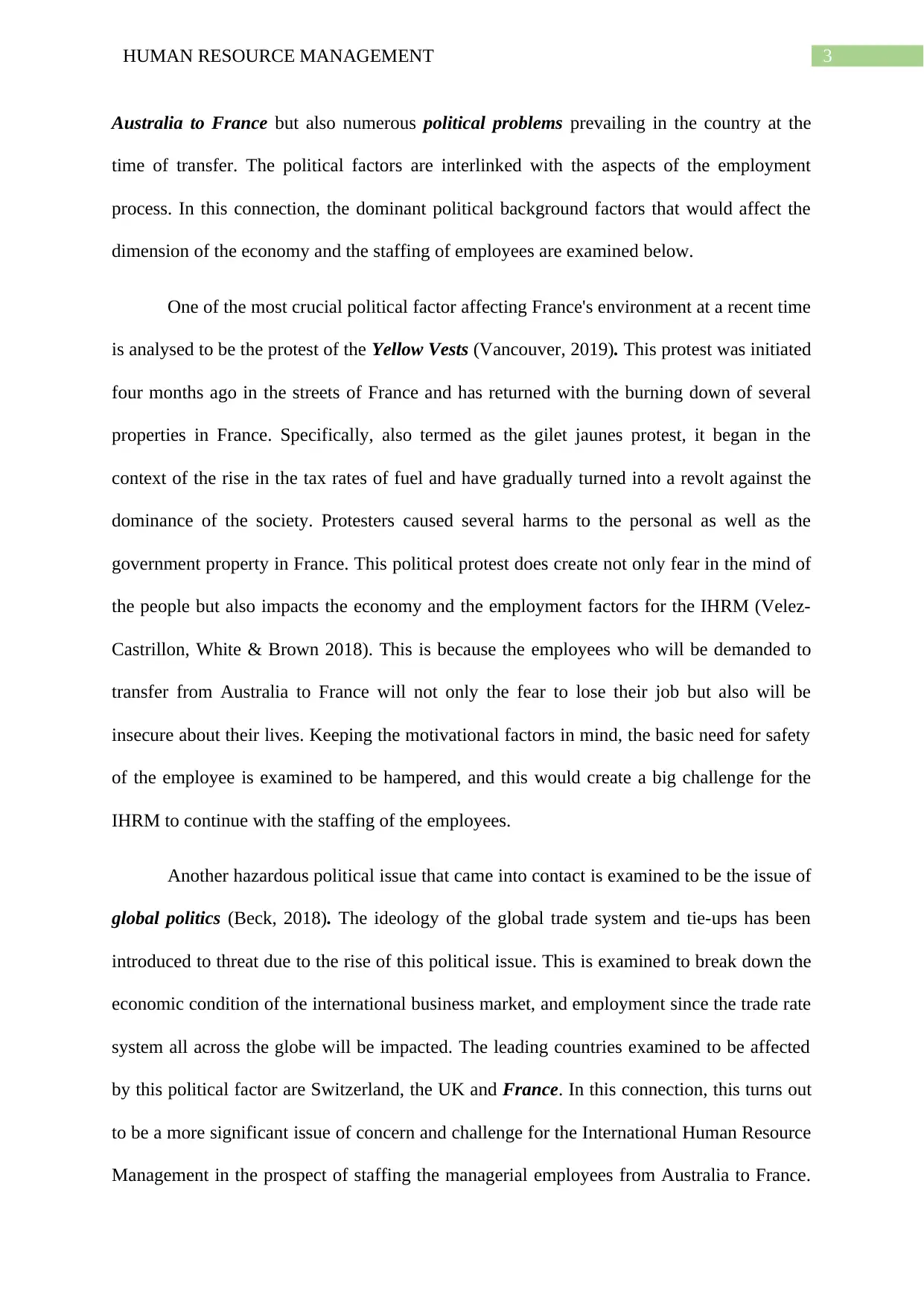
3HUMAN RESOURCE MANAGEMENT
Australia to France but also numerous political problems prevailing in the country at the
time of transfer. The political factors are interlinked with the aspects of the employment
process. In this connection, the dominant political background factors that would affect the
dimension of the economy and the staffing of employees are examined below.
One of the most crucial political factor affecting France's environment at a recent time
is analysed to be the protest of the Yellow Vests (Vancouver, 2019). This protest was initiated
four months ago in the streets of France and has returned with the burning down of several
properties in France. Specifically, also termed as the gilet jaunes protest, it began in the
context of the rise in the tax rates of fuel and have gradually turned into a revolt against the
dominance of the society. Protesters caused several harms to the personal as well as the
government property in France. This political protest does create not only fear in the mind of
the people but also impacts the economy and the employment factors for the IHRM (Velez-
Castrillon, White & Brown 2018). This is because the employees who will be demanded to
transfer from Australia to France will not only the fear to lose their job but also will be
insecure about their lives. Keeping the motivational factors in mind, the basic need for safety
of the employee is examined to be hampered, and this would create a big challenge for the
IHRM to continue with the staffing of the employees.
Another hazardous political issue that came into contact is examined to be the issue of
global politics (Beck, 2018). The ideology of the global trade system and tie-ups has been
introduced to threat due to the rise of this political issue. This is examined to break down the
economic condition of the international business market, and employment since the trade rate
system all across the globe will be impacted. The leading countries examined to be affected
by this political factor are Switzerland, the UK and France. In this connection, this turns out
to be a more significant issue of concern and challenge for the International Human Resource
Management in the prospect of staffing the managerial employees from Australia to France.
Australia to France but also numerous political problems prevailing in the country at the
time of transfer. The political factors are interlinked with the aspects of the employment
process. In this connection, the dominant political background factors that would affect the
dimension of the economy and the staffing of employees are examined below.
One of the most crucial political factor affecting France's environment at a recent time
is analysed to be the protest of the Yellow Vests (Vancouver, 2019). This protest was initiated
four months ago in the streets of France and has returned with the burning down of several
properties in France. Specifically, also termed as the gilet jaunes protest, it began in the
context of the rise in the tax rates of fuel and have gradually turned into a revolt against the
dominance of the society. Protesters caused several harms to the personal as well as the
government property in France. This political protest does create not only fear in the mind of
the people but also impacts the economy and the employment factors for the IHRM (Velez-
Castrillon, White & Brown 2018). This is because the employees who will be demanded to
transfer from Australia to France will not only the fear to lose their job but also will be
insecure about their lives. Keeping the motivational factors in mind, the basic need for safety
of the employee is examined to be hampered, and this would create a big challenge for the
IHRM to continue with the staffing of the employees.
Another hazardous political issue that came into contact is examined to be the issue of
global politics (Beck, 2018). The ideology of the global trade system and tie-ups has been
introduced to threat due to the rise of this political issue. This is examined to break down the
economic condition of the international business market, and employment since the trade rate
system all across the globe will be impacted. The leading countries examined to be affected
by this political factor are Switzerland, the UK and France. In this connection, this turns out
to be a more significant issue of concern and challenge for the International Human Resource
Management in the prospect of staffing the managerial employees from Australia to France.
Paraphrase This Document
Need a fresh take? Get an instant paraphrase of this document with our AI Paraphraser
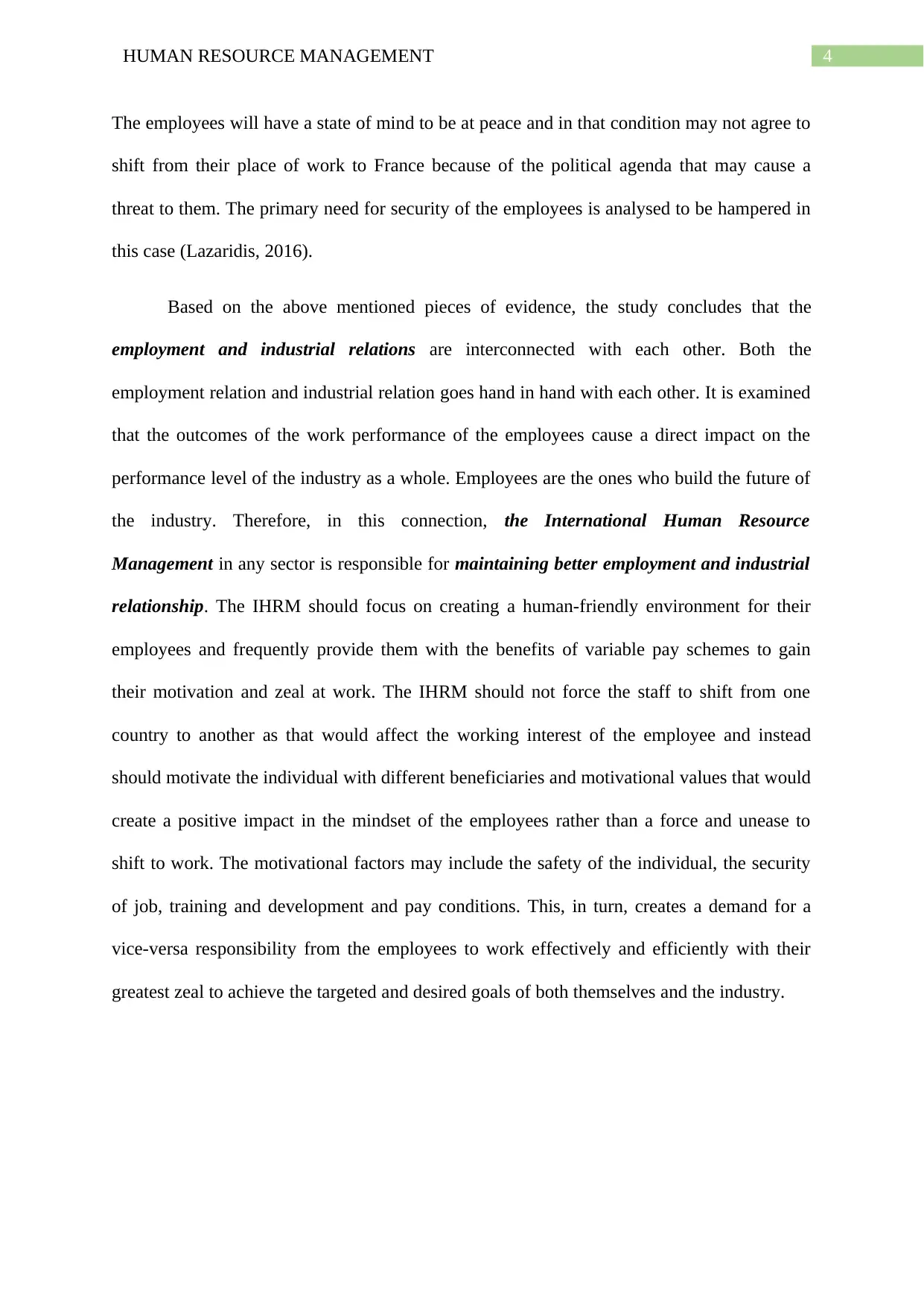
4HUMAN RESOURCE MANAGEMENT
The employees will have a state of mind to be at peace and in that condition may not agree to
shift from their place of work to France because of the political agenda that may cause a
threat to them. The primary need for security of the employees is analysed to be hampered in
this case (Lazaridis, 2016).
Based on the above mentioned pieces of evidence, the study concludes that the
employment and industrial relations are interconnected with each other. Both the
employment relation and industrial relation goes hand in hand with each other. It is examined
that the outcomes of the work performance of the employees cause a direct impact on the
performance level of the industry as a whole. Employees are the ones who build the future of
the industry. Therefore, in this connection, the International Human Resource
Management in any sector is responsible for maintaining better employment and industrial
relationship. The IHRM should focus on creating a human-friendly environment for their
employees and frequently provide them with the benefits of variable pay schemes to gain
their motivation and zeal at work. The IHRM should not force the staff to shift from one
country to another as that would affect the working interest of the employee and instead
should motivate the individual with different beneficiaries and motivational values that would
create a positive impact in the mindset of the employees rather than a force and unease to
shift to work. The motivational factors may include the safety of the individual, the security
of job, training and development and pay conditions. This, in turn, creates a demand for a
vice-versa responsibility from the employees to work effectively and efficiently with their
greatest zeal to achieve the targeted and desired goals of both themselves and the industry.
The employees will have a state of mind to be at peace and in that condition may not agree to
shift from their place of work to France because of the political agenda that may cause a
threat to them. The primary need for security of the employees is analysed to be hampered in
this case (Lazaridis, 2016).
Based on the above mentioned pieces of evidence, the study concludes that the
employment and industrial relations are interconnected with each other. Both the
employment relation and industrial relation goes hand in hand with each other. It is examined
that the outcomes of the work performance of the employees cause a direct impact on the
performance level of the industry as a whole. Employees are the ones who build the future of
the industry. Therefore, in this connection, the International Human Resource
Management in any sector is responsible for maintaining better employment and industrial
relationship. The IHRM should focus on creating a human-friendly environment for their
employees and frequently provide them with the benefits of variable pay schemes to gain
their motivation and zeal at work. The IHRM should not force the staff to shift from one
country to another as that would affect the working interest of the employee and instead
should motivate the individual with different beneficiaries and motivational values that would
create a positive impact in the mindset of the employees rather than a force and unease to
shift to work. The motivational factors may include the safety of the individual, the security
of job, training and development and pay conditions. This, in turn, creates a demand for a
vice-versa responsibility from the employees to work effectively and efficiently with their
greatest zeal to achieve the targeted and desired goals of both themselves and the industry.
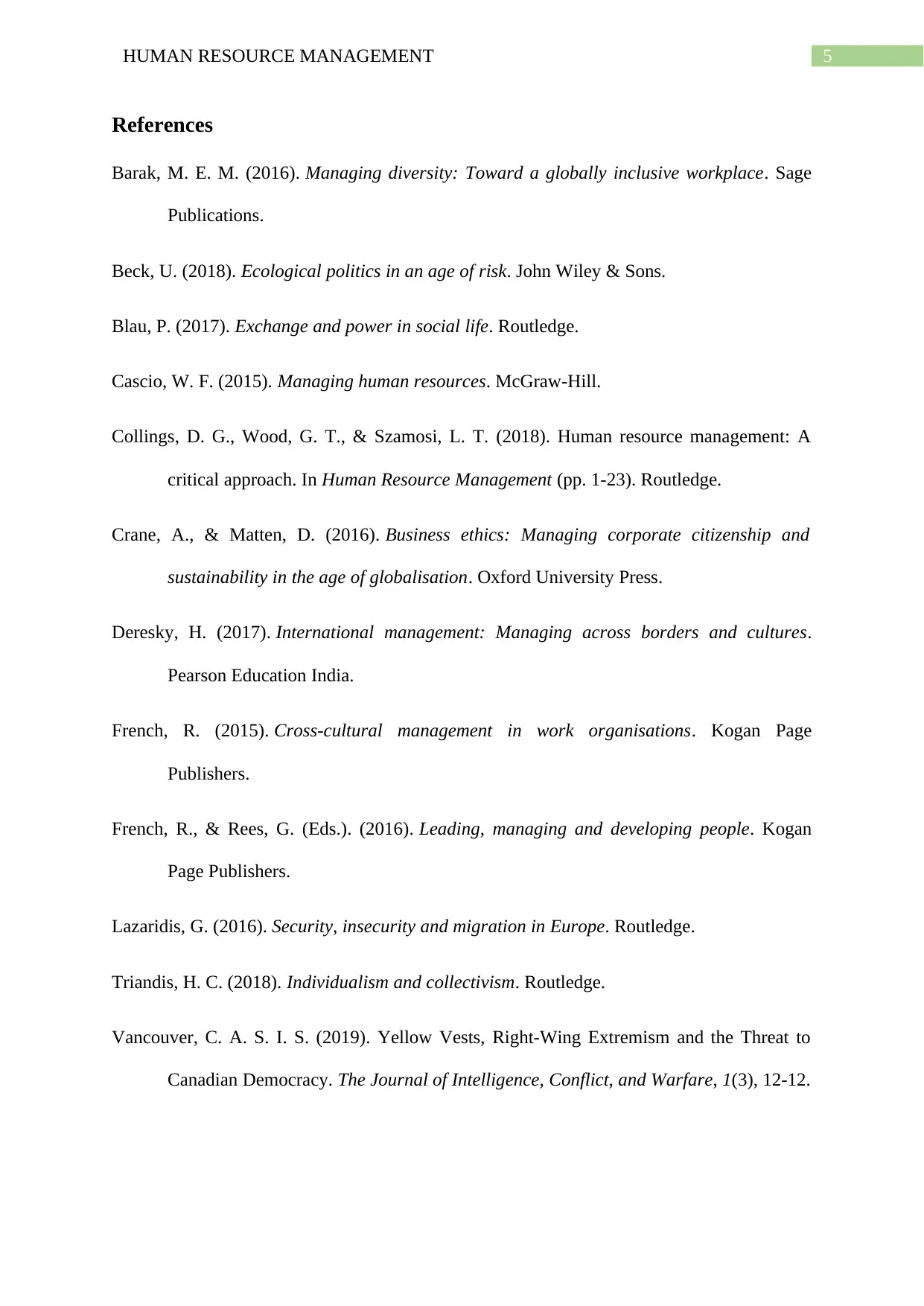
5HUMAN RESOURCE MANAGEMENT
References
Barak, M. E. M. (2016). Managing diversity: Toward a globally inclusive workplace. Sage
Publications.
Beck, U. (2018). Ecological politics in an age of risk. John Wiley & Sons.
Blau, P. (2017). Exchange and power in social life. Routledge.
Cascio, W. F. (2015). Managing human resources. McGraw-Hill.
Collings, D. G., Wood, G. T., & Szamosi, L. T. (2018). Human resource management: A
critical approach. In Human Resource Management (pp. 1-23). Routledge.
Crane, A., & Matten, D. (2016). Business ethics: Managing corporate citizenship and
sustainability in the age of globalisation. Oxford University Press.
Deresky, H. (2017). International management: Managing across borders and cultures.
Pearson Education India.
French, R. (2015). Cross-cultural management in work organisations. Kogan Page
Publishers.
French, R., & Rees, G. (Eds.). (2016). Leading, managing and developing people. Kogan
Page Publishers.
Lazaridis, G. (2016). Security, insecurity and migration in Europe. Routledge.
Triandis, H. C. (2018). Individualism and collectivism. Routledge.
Vancouver, C. A. S. I. S. (2019). Yellow Vests, Right-Wing Extremism and the Threat to
Canadian Democracy. The Journal of Intelligence, Conflict, and Warfare, 1(3), 12-12.
References
Barak, M. E. M. (2016). Managing diversity: Toward a globally inclusive workplace. Sage
Publications.
Beck, U. (2018). Ecological politics in an age of risk. John Wiley & Sons.
Blau, P. (2017). Exchange and power in social life. Routledge.
Cascio, W. F. (2015). Managing human resources. McGraw-Hill.
Collings, D. G., Wood, G. T., & Szamosi, L. T. (2018). Human resource management: A
critical approach. In Human Resource Management (pp. 1-23). Routledge.
Crane, A., & Matten, D. (2016). Business ethics: Managing corporate citizenship and
sustainability in the age of globalisation. Oxford University Press.
Deresky, H. (2017). International management: Managing across borders and cultures.
Pearson Education India.
French, R. (2015). Cross-cultural management in work organisations. Kogan Page
Publishers.
French, R., & Rees, G. (Eds.). (2016). Leading, managing and developing people. Kogan
Page Publishers.
Lazaridis, G. (2016). Security, insecurity and migration in Europe. Routledge.
Triandis, H. C. (2018). Individualism and collectivism. Routledge.
Vancouver, C. A. S. I. S. (2019). Yellow Vests, Right-Wing Extremism and the Threat to
Canadian Democracy. The Journal of Intelligence, Conflict, and Warfare, 1(3), 12-12.
⊘ This is a preview!⊘
Do you want full access?
Subscribe today to unlock all pages.

Trusted by 1+ million students worldwide
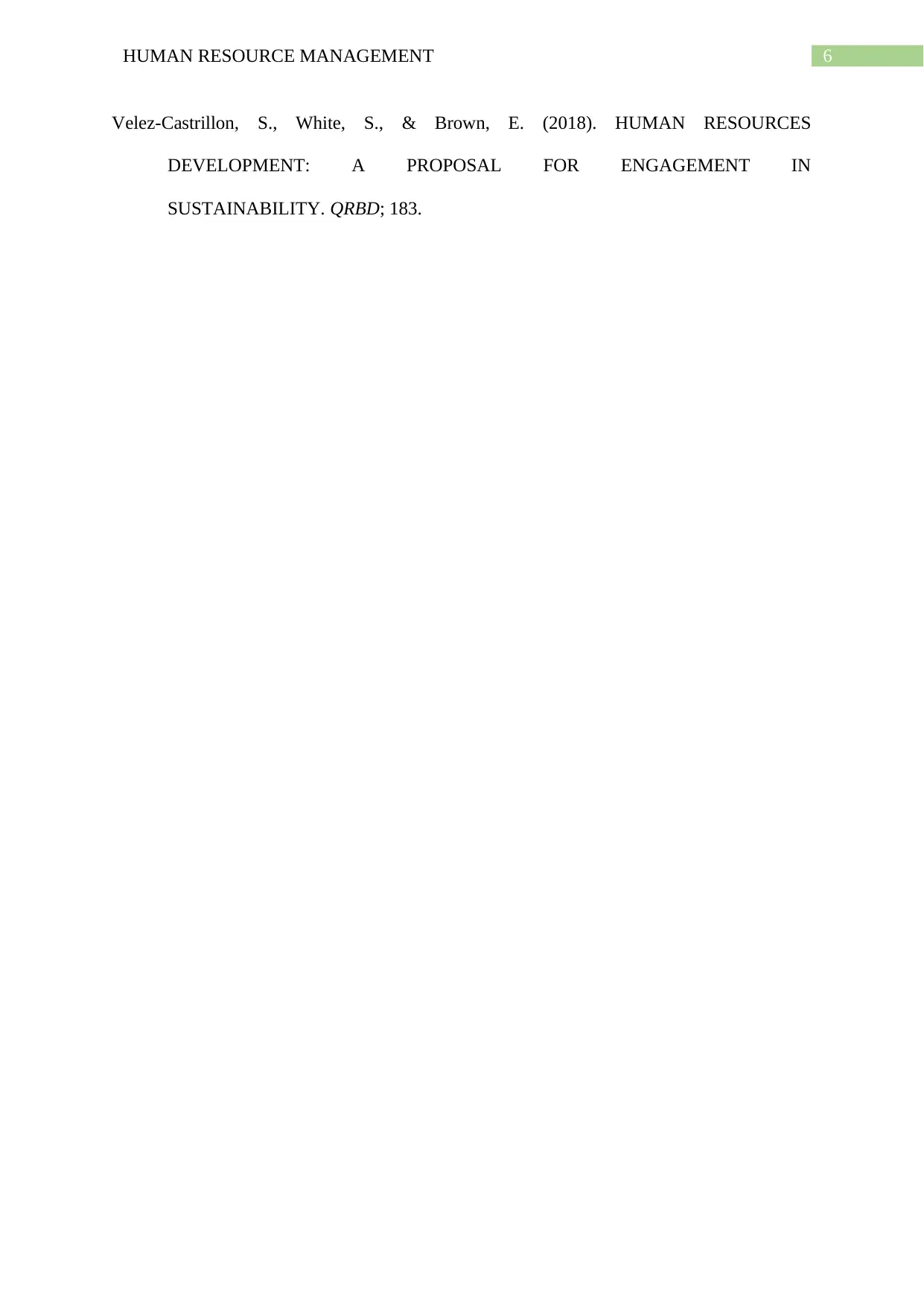
6HUMAN RESOURCE MANAGEMENT
Velez-Castrillon, S., White, S., & Brown, E. (2018). HUMAN RESOURCES
DEVELOPMENT: A PROPOSAL FOR ENGAGEMENT IN
SUSTAINABILITY. QRBD; 183.
Velez-Castrillon, S., White, S., & Brown, E. (2018). HUMAN RESOURCES
DEVELOPMENT: A PROPOSAL FOR ENGAGEMENT IN
SUSTAINABILITY. QRBD; 183.
1 out of 7
Related Documents
Your All-in-One AI-Powered Toolkit for Academic Success.
+13062052269
info@desklib.com
Available 24*7 on WhatsApp / Email
![[object Object]](/_next/static/media/star-bottom.7253800d.svg)
Unlock your academic potential
Copyright © 2020–2026 A2Z Services. All Rights Reserved. Developed and managed by ZUCOL.




